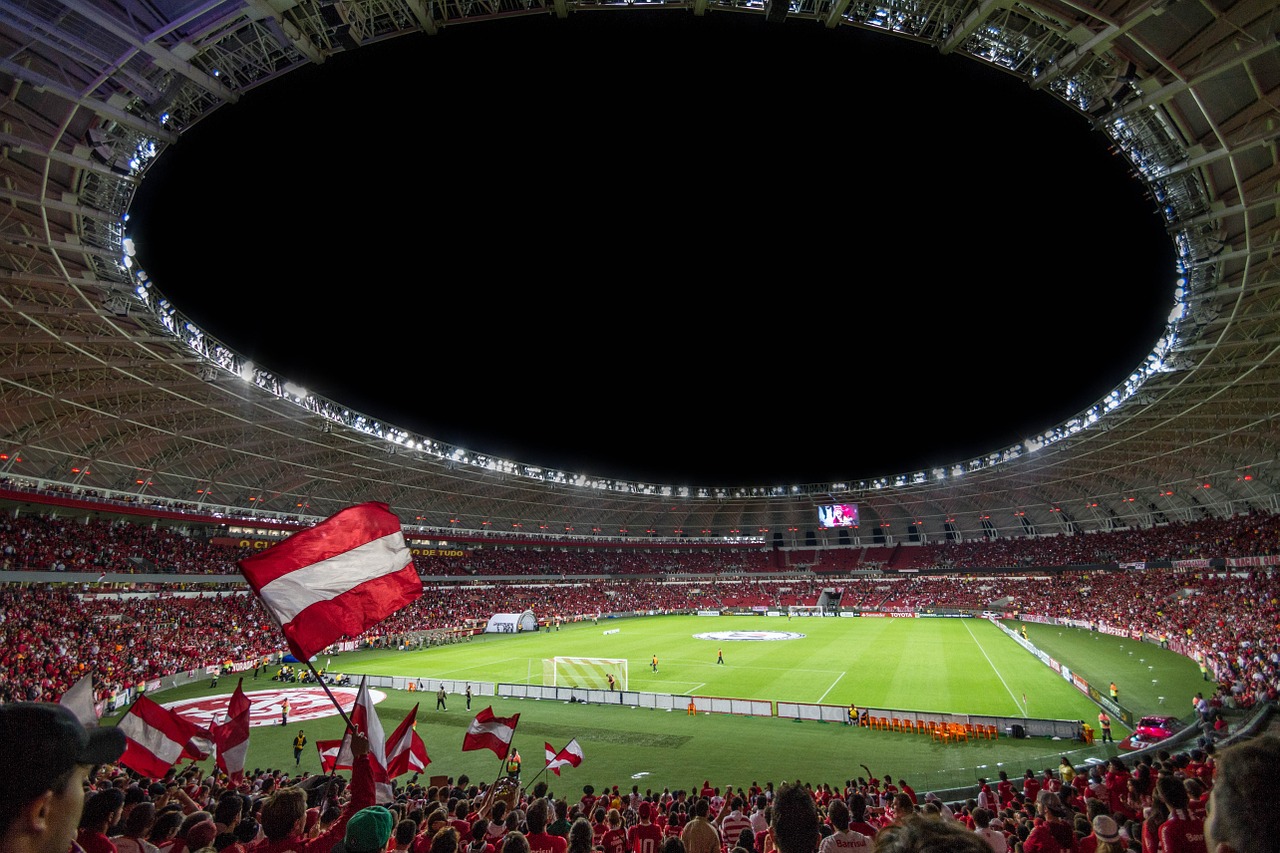Crowds of people, food, and drink, specialist sound and lighting equipment, staff or performing artists not turning up. Whether you operate a sports or entertainment venue there’s no shortage of health and safety issues and operational risks that can threaten your business. Logistically it’s complex, but taking the time to analyse what could go wrong will help you to take the appropriate steps to try to avoid it happening. And it can also help you to make sure your insurance covers you if something unfortunate does happen.
Read our guide to the top 10 risks for anyone managing a stadium, arena or venue to make sure you’ve got everything covered.
1) Crowd safety
In the 2013/14 season, Premier and football league clubs reported 1,088 spectator injuries at their grounds. Slips, trips, and falls are all common occurrences anywhere you have gatherings of people mixed with food and drink, but if an injury is caused as a result of your negligence, for example slipping on spilt liquid in an area not cordoned-off or on a loose carpet or wire, you could be faced with a claim. Poorly maintained grounds can also cause injuries. And if specialist equipment is brought in for an event and not set up correctly that poses a further hazard.
Regardless of your stadium size or attendance numbers, keeping the public safe is crucial. High profile cases such as Hillsborough have revolutionized the way stadiums have to think about accessibility and security. And safety measures have had a major positive impact in limiting the potential for violence to arise between rival fans.
Keeping spectators safe is a number one priority for all stadium managers and The Sports Ground Safety Association offers plenty of guidance on best practice for design and maintenance. As well as taking steps to ensure all necessary safety measures are in force, public liability insurance is an essential to keep your business protected financially.
Public liability insurance covers the legal fees for representation, as well as any compensation awarded. It’s designed to cover you financially from claims brought against you by contractors, suppliers or any member of the public. And it covers claims for accidental injury or damage to property. Depending on the scope of your stadium or arena, you can opt for public liability cover up to £5million, £10million or even more.

2) Food, glorious food
Around 40,000 pints of beer can be served at Wembley Stadium during half time at a football or rugby match. Whether your stadium matches that level or is a little more modest, it’s likely that income from selling food and drink makes up a large percentage of your profits. If something goes wrong and you’re not able to serve, it can severely affect your revenue. The same applies if you also cater as part of a corporate event and can’t supply what has been promised, leaving your business wide open to claims for compensation.
Unfortunately, there are lots of potential problems that could affect your ability to sell food and drinks, from faulty catering equipment and broken down vehicles failing to deliver essential supplies to an accident damaging the food you have made and all these risks can be covered by your stadium insurance.
But it’s not just losing sales that make food and drink an important consideration when it comes to stadium insurance. Football fans are notoriously fond of a pie or two, and serving any warm meat product brings about additional risks when it comes to food poisoning. Public liability insurance can protect you from claims arising from incidences of food poisoning as well as other food-related claims, such as an allergic reaction to an ingredient in incorrectly labelled food.
As allergic reactions and food poisoning can, in extreme circumstances, lead to death, it’s important that your business is fully insured. Updated sentencing guidelines for food safety and hygiene offences came into force in February 2016. These guidelines now link fine values to the turnover of your business, with fines reaching up to £3million. At that level of risk, it’s essential to be comprehensively covered.
3) Special events
Do you use your venue for special events, such as firework displays or charity fundraisers like zip wire rides over the grounds? If so, you’ll need to speak to your insurance provider to make sure you are covered.
High-risk events, such as firework displays, also need careful consideration of the perils involved. If you are using a professional firework display company they might reassure you that they have fireworks insurance, but you’ll still need to consider if any other extra insurance is needed for the event.
 Your one-off events might already be included in your stadium insurance package, but if your insurer has not been notified it could invalidate your claim. You might need to pay extra to cover your stadium for additional risk factors. Depending on the event, you may have more equipment on-site that will need to be insured. Or you may expect larger crowds than normal. All these issues should be considered in advance to make sure you don’t leave your business open to risk.
Your one-off events might already be included in your stadium insurance package, but if your insurer has not been notified it could invalidate your claim. You might need to pay extra to cover your stadium for additional risk factors. Depending on the event, you may have more equipment on-site that will need to be insured. Or you may expect larger crowds than normal. All these issues should be considered in advance to make sure you don’t leave your business open to risk.
4) Staffing issues
By law, you need to have employer’s liability insurance even if you only employ people part-time or under contract. It will protect you in the case of claims for injury at work and without it, you can be fined up to £2,500 a day. If something does happen, breaches to health and safety and corporate manslaughter are subject to fines linked to business turnover and reach up to £10million.
To try to prevent injuries you’ll need to complete a full risk assessment. Once you’ve identified potential risks to your staff during their work, brief all staff fully on these risks. And you’ll also have a duty to ensure your team has had the correct training necessary to carry out their role safely.
Potential damages claims from employees are not the only staffing issue you’re likely to face. Your team is essential to your business’ success – without them, the show can’t go on. If you have key members of staff who you’d be totally lost without, you can take out insurance that will pay out if they do leave. And if you’re that key person who is holding it all together, you can also take out personal injury insurance to help keep your business running even if you have an accident that prevents you from working.
5) Terrorism insurance
Unfortunately, sporting and music events are a major target for terrorists. And it’s not just international games that are within the terrorists’ sights. The shocking attacks in Paris in November 2015 targeted a modest-sized music venue with a relatively low-profile band playing. And in 2017, Manchester Arena was the venue targeted for the appalling attack that left 22 people dead, 120 people injured and thousands psychologically scarred.
Whatever the size of your venue, and whatever events you hold, you’re at risk. That’s because your venue attracts crowds to gather together, making it at threat of a terrorist attack. Specialist terrorism insurance is an important addition to your stadium insurance package.
A commercial terrorism insurance policy includes protection against damaged or completely destroyed property, including buildings, business equipment and other contents. If you’re concerned how your business could survive if it is forced closed for a period of time following a terrorist attack, you can take out cover that reimburses you for lost income due to business interruption. And you can also opt for insurance that will cover any liability claims that are brought against your business. Depending on the scale of your business, you can tailor your terrorism insurance accordingly. Just remember it is not normally included automatically with your stadium insurance but needs to be considered as an add-on.
6) Money
Do you welcome spectators who pay on the door or serve food and drink? if so, it’s likely you’ll have a lot of cash on site during a game or event. This makes you a target for theft, including violent theft and break-ins.
In 2013, the Johannesburg Soccer City stadium in South Africa lost over £200,000 following a break-in to the strong room. Always lock cash away out of sight. And make sure money is covered at your venue, and in transit to the bank, by taking out money insurance.
 7) Buildings insurance
7) Buildings insurance
Your stadium or venue is where it all happens. Without it, you can’t host a football match, stage an athletics competition or hold a pop concert. Because of their size, stadiums are often an iconic part of the local landscape. This can make them more costly to rebuild if anything did happen. Don’t be tempted to skimp in this area. if you underestimate the cost of rebuilding and you need to, you’ll be left with a shortfall. And that could see your business forced to close down. Also, consider additional structures, such as a clubhouse or hospitality areas. And consider the costs of replacing all fittings, from specialist lights to replacing toilet facilities.
8) Trophies and cups
If you run a sporting venue, we really hope you’ve had a successful past (and will continue this success in the future). Success brings with it valuable trophies and cups. These symbols of inspiration might be priceless to you, but fortunately, they can also be insured should a replacement become necessary. Any club is proud of their achievements and should display them with joy. Knowing these historical treasures are insured against damage or theft can really help put your mind at rest.
9) Essential equipment
What happens if the floodlights stop working or the sound system or the electronic scoreboard gets damaged? Make sure your insurance covers you for these expensive and important parts of your venue. If they do need to be replaced, you’ll need it sorted out quickly as without them you may be unable to run your business, and that can cost you money.
10) Business interruption, no-shows, and the glorious British weather
If your stadium has to close for a period of time, you could lose a huge part of your income. This is even more the case if you operate seasonally. other causes for concern are if you have an artist booked to perform and they don’t turn up. Or extreme weather events mean an event has to be cancelled. All these situations can mean you’ll be left in a difficult financial situation.
Ticket sales will be zero (or will have to be refunded), you won’t make any money from food and drink sales, and staff will still need to be paid. You can mitigate these loses with business interruption insurance or insurance specifically designed to cover you in the event of cancellation.
 Planning for risk
Planning for risk
Undertaking regular risk assessments is essential to try to minimize the potential for something to go wrong. And comprehensive insurance is another vital part of your risk management planning.
Because of the many hazards and threats involved with running a sports or entertainment venue, it can be hard to find the right level of insurance. You’ll find some insurance providers simply aren’t prepared to take that risk.
Whether you manage a large, state-of-the-art stadium or more modest local ground, our specialist team at Park Insurance can help. We have a track record of over 20 years helping people like you. Our close industry links enable us to access a wide range of insurance products perfectly suited to your requirements. And because we are independent brokers, you know we’ll genuinely find you the best deal out there.
We take the time to understand what you need
Our expert knowledge of the industry means we’ll find solutions and tailor-make your insurance package. That means peace of mind and a great value price. If you do need to make a claim, speak to your dedicated in-house manager. We’ll ensure it is dealt with promptly and efficiently, so you can focus on running your stadium or arena.
Get in touch now to find out more or call 0117 955 6835.

